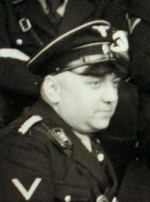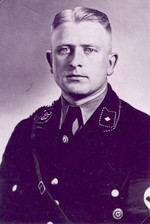
Günther Klingsporn
Günther Klingsporn was born in Berlin in 1903. He moved to Osthofen in 1928 and joined the Nazi Party and the SS in 1929. From 1924 to 1926 he had been a member of the Communist Party of Germany (KPD) at the other end of the political spectrum. From November 1929 onwards, Klingsporn was unemployed. Klingsporn was known to his political enemies as a very “brutal SS man" who actively participated in riots directed at the local branch of the Social Democratic Party of Germany (SPD). In 1933 he became a guard at the Osthofen concentration camp. Witnesses described him as a member of the “Einpeitscherkommando" (whip-commando) which abused Jews and especially despised political opponents in camp II. He disputed this assertion in his denazification trial in 1949 and the allegations could not be proven beyond a reasonable doubt. In 1940 he was drafted into the Waffen-SS and served as a guard of the SS Special Camp / Concentration Camp Hinzert until April 1941. As a member of the Waffen-SS he took part in World War II, holding the rank of Hauptscharführer (Master Sergeant). In May 1945, he was taken prisoner of war by US forces in Austria and subsequently interned until October 1948.
Wilhelm Tempel
Wilhelm Tempel was born in Duisburg in 1908. An unskilled worker, he joined the Nazi party in 1931 and the SS in 1932. He was a guard at the Osthofen Concentration Camp in 1933 and 1934. When the camp was disbanded he initially did not receive a new position, but later he was employed by the State Police Office in Darmstadt. From May 1940 to April 1942 he served in the camp commander's office at the SS Special Camp / Concentration Camp Hinzert holding the rank of Schütze (Private). Later he was transferred to Arbeitsdorf, a formally independent concentration camp that was part of the Neuengamme camp complex.
Ernst Ludwig Knobloch
Ernst Ludwig Knobloch was born in Osthofen in 1908. Like Günther Klingsporn he participated in local political conflicts. In 1932 he suffered a head injury in a street battle that made hospitalization necessary. From March 1933 to March 1934 he was a guard at the Osthofen Concentration Camp. After attending a course, he was employed as a dog handler. As a member of the SS Totenkopfverbände (SS Death's Head Units) he later served as a guard in the Concentration Camps at Sachsenhausen, Auschwitz, Flossenbürg, Hinzert, Mittelbau-Dora and Bergen-Belsen. The French „Tribunal General“ investigated him for crimes he committed at the SS Special Camp / Concentration Camp Hinzert. He was tried and acquitted. In 1965 he was again under investigation for murder committed during the death march from the subcamp Klein-Bodungen to Bergen-Belsen Concentration Camp. The result of the investigation has not been ascertained. The court in his denazification trial ruled in 1949 that Knobloch should be “classified as a lesser offender [...] because nobody has brought forward any charges against the defendant, so that it can be safely assumed that he has behaved properly during the Nazi era." Knobloch died on April 6, 1973 in Osthofen.
Hans Winter
Hans Winter was born in 1908 in Osthofen where he worked as a wine merchant. He joined the Nazi party as early as 1926 and the SS in 1933. According to Ernst Weber, chairman of the local division of the Nazi party, he was an informant of Jakob Sprenger, Gauleiter of Hesse-Nassau.
Winter joined the guard detachment at the SS Special Camp / Concentration Camp Hinzert on March 15, 1940. In the same year he was promoted to the rank of Unterscharführer (Sergeant) and six months later to Scharführer (Staff Sergeant). Albert Magnotte, a prisoner from Luxemburg at Hinzert, testified before a commission of inquiry that investigated crimes at Hinzert that he was beaten by Winter, the “main educator†at the camp. During the trials of Josef Brendel and Georg Schaaf at the Mannheim district court, Winter was again accused of crimes. Jean-Pierre Wickeler, another Luxembourg prisoner at Hinzert testified under oath: “In 1942, the defendant Schaaf and SS-man Winter beat the Luxembourg prisoner August Felix at a workplace outside the camp with a stick until he collapsed unconscious." (Jean-Pierre Wickeler, born April 3, 1923 in Niederwiltz, Luxembourg; statement under oath, dated February 7, 1945) It is not yet certain if Winter was ever charged. He died on October 20, 1989 in Worms.





